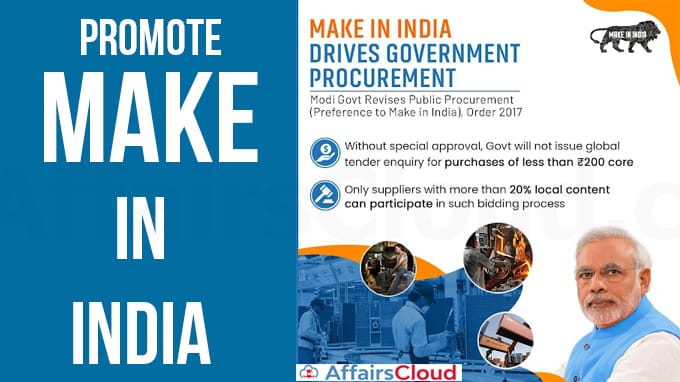 In order to promote the “Make in India” initiative, the Central Government has amended the Public Procurement (Preference to Make in India) Order, 2017 on September 16, 2020. This amendment will enable nodal Ministries/ Departments to notify higher minimum local content requirements for Class-I & Class-II local suppliers which was earlier fixed at 50% and 20% respectively.
In order to promote the “Make in India” initiative, the Central Government has amended the Public Procurement (Preference to Make in India) Order, 2017 on September 16, 2020. This amendment will enable nodal Ministries/ Departments to notify higher minimum local content requirements for Class-I & Class-II local suppliers which was earlier fixed at 50% and 20% respectively.
- The notification in this regard was issued by the Department for Promotion of Industry and Internal Trade (DPIIT), Minister of Commerce and Industry.
What Amendment Says?
–As per the amendment, the participation in the procurement process is disallowed for the countries which bar Indian companies from being part of their government procurement process in any item. These companies can only participate for the list of items published by the ministry/department.
–The amendment also restricted the specifying foreign certifications, putting in place unreasonable technical specifications, brands and models in the bid document because it acts as a discriminatory practice against local suppliers.
–Foreign certification, if required, shall be stipulated only with the approval of the secretary of the department concerned.
–All administrative ministries/departments whose procurement exceeds Rs 1,000 crore per annum should notify their projections for the next five years on their respective websites.
Apart from above the government will notify an upper threshold value of procurement beyond which foreign companies can enter into a joint venture (JV) with an Indian company to participate in government tenders.
Points to be noted:-
Local content means the amount of value added in India which shall,unless otherwise prescribed by the Nodal Ministry , be the total value of the item procured (excluding net domestic indirect taxes) minus the value of imported content in the item (including all custom duties) as a proportion of the total value , in present.
‘Class I local supplier’ means a supplier or service provider ,whose goods, services or works offered for procurement meets the minimum local content as prescribed for “Class I local subscriber ‘under this order.
‘Class II local supplier’ means a supplier or service provider ,whose goods, services or works offered for procurement meets the minimum local content as prescribed for “Class II local subscriber‘ but less than that prescribed for ‘Class I local Supplier ‘under this order.
‘Non- Local supplier’ means a supplier or service provider , whose goods, services or works offered for procurement ,has local content less than that prescribed for “Class II local subscriber‘ under this order.
‘Nodal Ministry’ means the Ministry or Department Identified pursuant to this order in respect of a particular item of goods or services or works.
Recent Related News:
i.On June 4, 2020, Centre amended the Public Procurement Order, 2017 and mandated 50% for Class I and 20% for Class II local content requirement for local suppliers, replacing the earlier practice of awarding the tender to the lowest price bidder called L1, as part of the Aatmanirbhar Bharat mission.
ii.On July 23, 2020, the Government of India (GoI) has amended the Rule 144 of General Financial Rules (GFRs)2017 entitled “Fundamental principles of public buying” by inserting sub rule (ix) which has imposed restrictions on bidders of countries sharing land borders with India in public procurement tenders.
About Minister of Commerce and Industry:
Union Minister– Piyush Vedprakash Goyal
Minister of State (MoS)– Hardeep Singh Puri, Som Parkash




